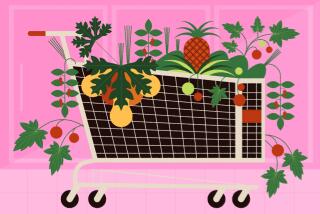This Year’s Seeds Hold Past, Future
- Share via
Saving seeds from this year’s tomatoes is a way to preserve varieties not offered by seed companies. These are seeds that have been handed down from parents to children and from neighbor to neighbor. Such seeds are from plants whose flowers self-pollinate.
Hybrid seeds, in contrast, are produced when two different varieties cross. Hybrid plants often are more robust than their parents and produce more uniform plants.
When it comes to flavor of vegetables and beauty of flowers, however, hybrid is not always “high-bred.” A lot of old garden varieties, grown from nonhybrid seeds, possess qualities lacking in modern hybrids. For example, new varieties of sweet peas cannot match the intoxicating fragrance of an old variety such as “Painted Lady,” introduced nearly two centuries ago.
*
Concern about the loss of old varieties led to the founding of Seed Saver’s Exchange. This nonprofit organization makes available some nonhybrid seeds and a list of sources for others.
Saving seeds from your garden favorites is not difficult. Select plants that are healthy, and guard against hybrid seed production. Some flowers may get pollen from another variety, particularly if different varieties are grown close together. Cucumber flowers are either male or female, so there is an especially good chance that they could receive pollen from a nearby, different variety. Hand pollinate and bag flowers, if necessary.
Let fruits mature, whether they are the dry pods of lettuce and radish plants or the juicy fruits of tomatoes and cucumbers. Take a few seeds out of mature tomatoes as you eat them; mature cucumbers are unfit to eat. Rinse well, then dry the seeds from juicy plants. No need to do anything with seeds you pop out of radish pods or rub from heads of marigolds or daisies, except to pack them away.
*
Seeds keep best when stored in a cool, dry place. Cooler temperature makes up for less dryness.
A good way to store seed packets is in a tightly closed jar.
Longevity depends on the type of seed and the storage conditions. Generally, corn and onion seeds keep for as long as a year; beans, peas and carrot seeds for two years; pepper seeds for three years; and lettuce, spinach, cucumber, squash and melon seeds for four years.
Seed Saver’s Exchange: (319) 382-5990.




